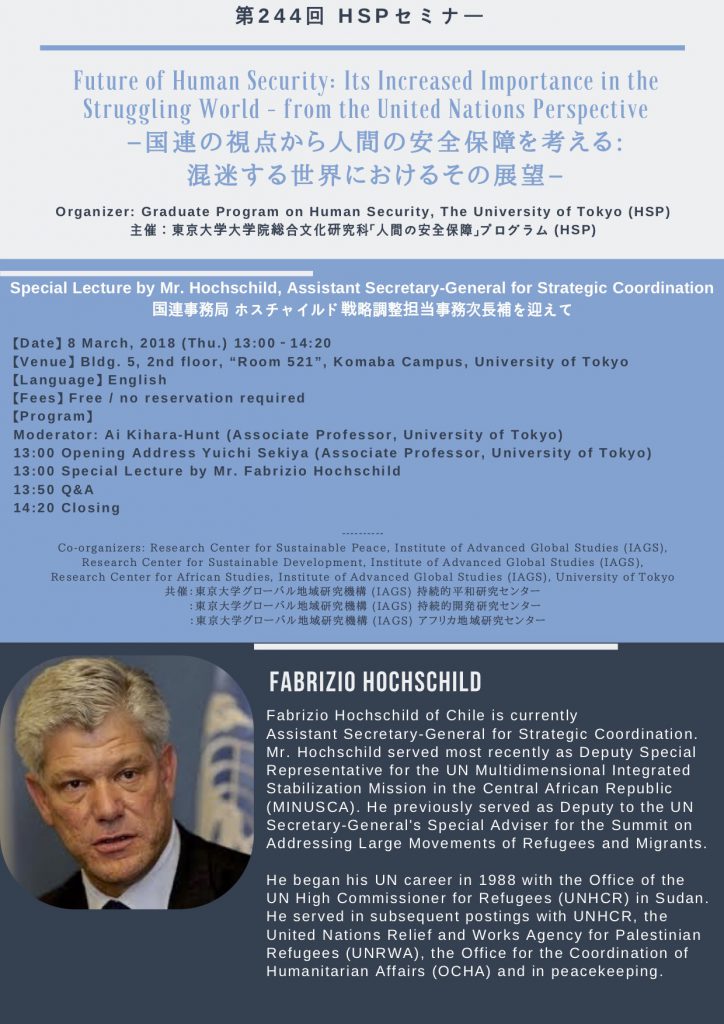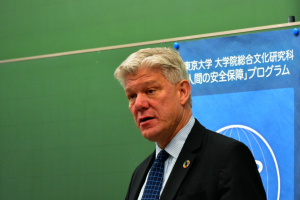第244回HSPセミナー「国連の視点から人間の安全保障を考える: 混迷する世界におけるその展望」
| 概要: | 
本セミナーは、国連事務次長補(戦略調整)ファブリツィオ・ホスチャイルド氏を特別講師に迎え、混迷する21世紀の世界において、より重要性を増す「人間の安全保障」の概念について、国連の立場から講演していただく。質疑応答の時間を取る。 |
| 日時: | 2018年3月8日(木)13:00-14:20 |
| 場所: | 東京大学駒場キャンパス 5号館 2階 521教室 |
| 講師: | ファブリツィオ・ホスチャイルド氏 (国連事務次長補 - 戦略調整) |
| 司会: | キハラハント 愛(東京大学准教授) |
| 言語: | 英語 |
| 主催: | 東京大学大学院総合文化研究科「人間の安全保障」プログラム (HSP) |
| 共催: | グローバル地域研究機構 (IAGS) 持続的平和研究センター グローバル地域研究機構 (IAGS) 持続的開発研究センター グローバル地域研究機構 (IAGS) アフリカ地域研究センター |
【英文要旨】
「国連の視点から人間の安全保障を考える:混迷する世界におけるその展望」
ファブリツィオ・ホスチャイルド氏 (国連事務次長補-戦略調整)

On 8 March, the Graduate Program on Human Security, the University of Tokyo, hosted a special lecture by the UN Assistant Secretary-General for Strategic Coordination, Mr. Fabrizio Hochschild.
He questioned if our generation could hope for a better world for the next generation while highlighting seven major challenges today: i) climate change, ii) growing inequality, iii) lack of clarity in geopolitical power relations leading to greater unpredictability, iv) increasing number and complexity of armed conflicts, v) global threat of terrorism, vi) reduction of space in human rights promotion and protection, and vii) uncertainty of frontier technology.
These threats are taking place simultaneously and are mutually reinforcing. For example, increasing inequality can push marginalized people to further alienation, give rise to nationalism and isolationalism, and create an opportunity for recruitment by extremist groups. The rise of terrorism comes with the absence of the rule of law and many terrorist-related activities operate in developing countries.
It is therefore important to have a comprehensive measure to address the root causes of terrorism. Technology advancement is moving at a speed that outstrips public scrutiny so much so that policy makers cannot keep up. When the internet was created, people hoped that it would make the world better, but such technology is also susceptible to new forms of manipulation in which it is used as a tool for warfare.
Currently, there is mistrust for multilateral organization including the UN. This is paradoxical, given the challenges that we are facing are transnational in nature, and require solutions through cooperation. The UN’s relevance is ever more vital.
The UN is under a major reform to make itself more effective, to tackle discrimination, to reduce bureaucracy, and to have better coherence in its approach. The emphasis of the reform is on prevention, anticipating crisis and building resilience.
On the Sustainable Development Goals (SDGs), Mr Hochschild described them as a comprehensive tool in addressing contemporary issues. Japan has been leading on the human security approach, which echoes the Secretary-General’s vision. Both concepts focus on the most vulnerable people. By taking an integrated, needs-based and comprehensive approach, and by addressing the root causes of issues, human security can bring results.

(要旨作成:溝端悠、キハラハント愛)




